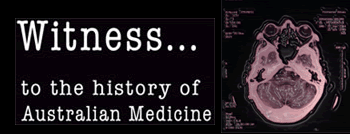


A chapter in the evolution of paediatrics in Australia
Introduction
Participants
Origins of the Department
Early developments
Leadership
New directions in patient care, research and teaching
Ethical issues in research and treatment
Formalising the research effort
Training Programs
Surgical research and training
Finding funds for research
Establishing sub-specialty departments
More on medical education
Academic outreach
Endnotes
Index
Search
Help
Contact us

Winston Rickards[24] : My comment really concerns the period before the Department was established. When I took over as Director of the Hospital's Department of Psychiatry in 1955, I found that the Medical Director, Vernon Collins, shared with me a vision of integrating paediatrics and psychiatry. We both recognised a need for doctors to inform themselves about the intellectual, emotional and social situations of children as well as their physical state of health or illness.
Arthur Clark[25] : I think I ought to pipe up at this stage. My name's Arthur Clark. Vernon, as you say, was appointed Professor of Child Health in 1959 and shortly afterwards, he did a tour of various places, including Boston and Canada. I joined the Department in 1961, from memory. Alex Venables[26] had already been appointed First Assistant [a University appointment equivalent to Associate Professor].[27]
Looking back on it now, it's struck me that Vernon was a very appropriate appointment, in the sense that the Hospital was at the centre of his life, he was more of a hospital person. Most of the research that was going on in the Hospital was undertaken by Dr Howard Williamsí group where you would encounter the only people who were involved in research in the Hospital.[28] I donít think either Alex Venables or I, at that stage, were doing any research in the University Department of Paediatrics and, for instance, we had virtually no research grants. This was 1961, but by 1965 that had changed and I was doing research.
I have a little hobby horse I just want to mention, and that is that I think paediatrics at that time had become too divorced from adult medicine and from research generally because of a preoccupation with developing paediatrics as a specialty. Some people were shocked if adult cardiologists ever laid a stethoscope on a child. It is an attitude that has changed today with much more contact between paediatricians and adult doctors. But vestiges of the former attitude remain.
Ann Westmore: So the development of paediatrics as a specialty was a major concern at the Children's Hospital in the early 1960s?
Arthur Clark: Yes, I think so. And I think it was continuing through the 1960s and effectively, of course, it took a few years for the University Department to get research students and research funding. And in fact I think this changed only when David Danks saw the same problem and went to the University and worked there and brought back University concepts.
Ann Westmore: Are there others here who agree with Arthur's point of view about paediatrics becoming too divorced from adult medicine?
Bernard Neal[29] : I'd like to extend Arthurís comments by just saying that to do this seminar properly, the more input you can get on the background psychological unspoken attitudes and so forth, the more you will throw a lot of light on the whole understanding [of what was happening].
I think there was what one might call a necessary, and not entirely happy, relationship in two different quarters. One was the teaching doctors in hospitals on the one hand [who were] in a state of tension re what they at first saw as pie-in-the-sky, academic, ivory tower conclusions from know-alls at the University and they wouldn't have a bar of them.[30] If you donít understand that tension, youíll miss a lot of the point.
And secondly, there was a somewhat similar dilemma, which Arthur Clark has rightly pointed to, in the relationship between paediatric medicine and adult medicine.[31] There was a lot to be said on both sides of this, and many many anecdotes about the disastrous effects of adult cardiologists putting stethoscopes on children and so on. And achieving the independence of paediatrics as a discipline, like many other independence movements, was not easily achieved. So that subsequently you had to get a happy marriage between academia, university and hospital, and we had to get a happy marriage between adult and paediatric medicine.
I just make these points on those two phenomena as part of the psychological background. I was an early Clinical Supervisor and, at that time, the training of medical students was about as far as the University came into the whole scene. Everyone was very happy to leave it at that because it wasn't their business, the teaching of medical students in paediatrics was done entirely by the Hospital, as you said before in mentioning Boyd Graham. There was a position called the Dean [of the Clinical School] with responsibility for many of these functions and this was entirely within the aegis of the senior medical staff. And they then appointed the supervisors and so forth who were obviously necessary.
 |
Witness to the History of Australian Medicine |  |
© The University of Melbourne 2005-16
Published by eScholarship Research Centre, using the Web Academic Resource Publisher
http://witness.esrc.unimelb.edu.au/007.html